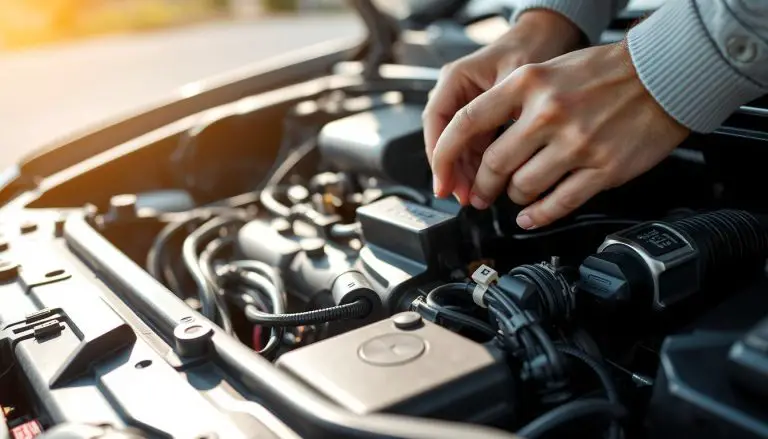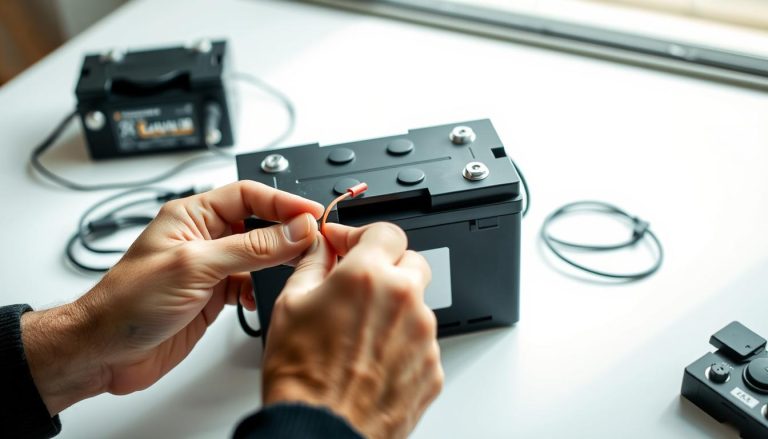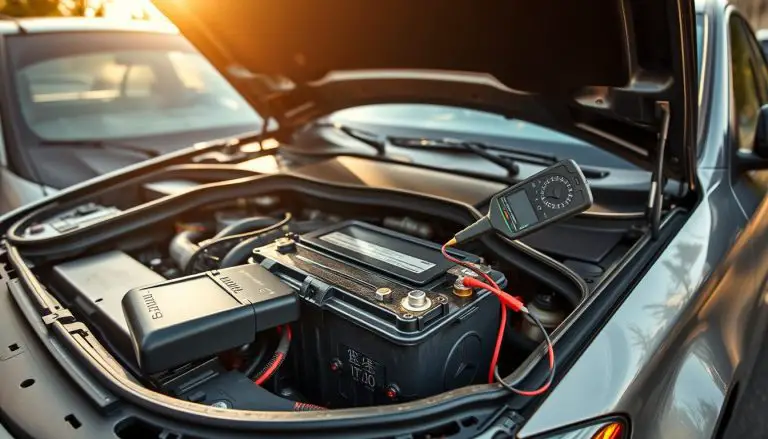Modern vehicles increasingly feature start-stop technology to reduce emissions and save fuel. This innovation requires specialized batteries designed to handle frequent engine cycling. But what if you own a conventional vehicle without this technology? Can you install a stop-start battery in a normal car, and should you?
This comprehensive guide explores the compatibility, benefits, potential issues, and expert recommendations to help you make an informed decision about using stop-start batteries in conventional vehicles.
What Are Stop-Start Batteries and How Do They Work?
Stop-start batteries are specially engineered power sources designed for vehicles with automatic start-stop systems. These systems automatically shut off the engine when the vehicle is stationary (such as at traffic lights) and restart it when the driver releases the brake or presses the accelerator. This technology helps reduce fuel consumption and emissions, particularly in urban driving conditions with frequent stops.
Unlike conventional batteries that primarily provide a single high-current burst to start the engine, stop-start batteries must deliver reliable power to vehicle electronics when the engine is off and still maintain enough charge to restart the engine multiple times during a journey. This creates unique demands that conventional batteries aren’t designed to handle.
Two Main Types of Stop-Start Batteries
Enhanced Flooded Battery (EFB)
EFB batteries are improved versions of traditional lead-acid batteries. They feature enhanced plate designs with polyester scrim material that helps hold active material on the plates during the frequent charging and discharging cycles of start-stop operation. EFBs typically offer:
- 2-3 times the cycle life of conventional batteries
- Better charge acceptance
- Improved resistance to deep discharge
- Suitable for entry-level start-stop systems
Absorbent Glass Mat (AGM) Battery
AGM batteries represent more advanced technology where the electrolyte is absorbed in fiberglass mats between the lead plates. This design offers significant advantages:
- 3-4 times the cycle life of conventional batteries
- Superior vibration resistance
- Completely spill-proof design
- Better performance in extreme temperatures
- Used in vehicles with advanced start-stop systems and energy recuperation
Compatibility: Can You Use a Stop-Start Battery in a Normal Car?
The short answer is yes, you can use a stop-start battery (either EFB or AGM) in a conventional car without start-stop technology. However, there are several important considerations to keep in mind before making this decision.
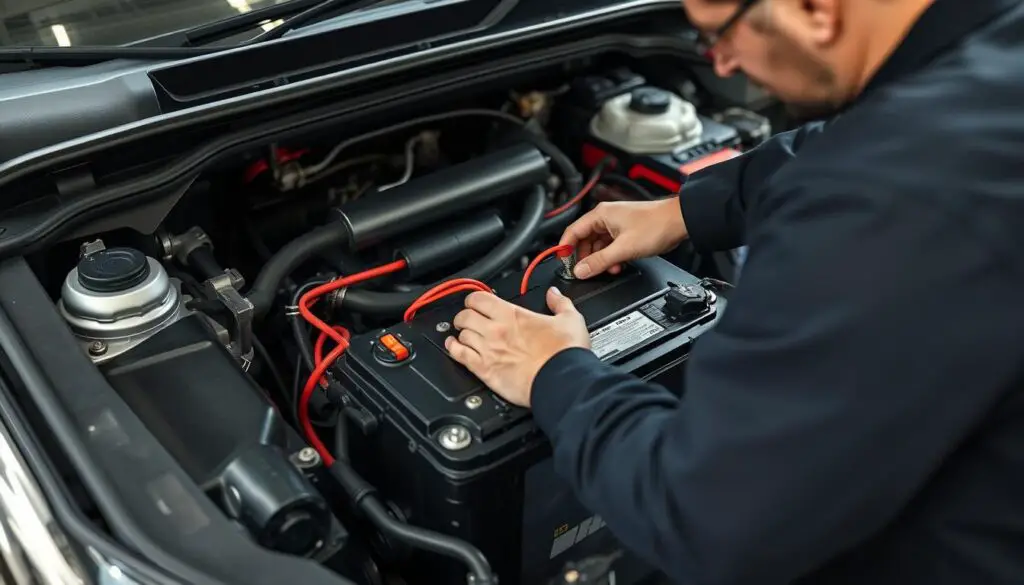
Technical Compatibility Factors
| Compatibility Factor | Details | Potential Issues |
| Physical Dimensions | Stop-start batteries must match the size group of your original battery | Some AGM batteries may have slightly different terminal positions or case designs |
| Voltage Requirements | Both conventional and stop-start batteries operate at 12V | Generally no issues as voltage is standardized |
| Charging System | Conventional alternators may not be optimized for AGM/EFB charging profiles | Potential for undercharging or overcharging without smart charging systems |
| Battery Management System | Modern vehicles often have sophisticated battery monitoring | Vehicle computers may not recognize different battery characteristics |
| Terminal Type | Must match your vehicle’s terminal configuration | Some stop-start batteries have additional terminals for monitoring |
Important Note: While you can install a stop-start battery in a conventional car, the reverse is not true. Never install a conventional battery in a vehicle designed for start-stop operation, as this can lead to premature battery failure and potential damage to vehicle systems.
Pros and Cons of Using a Stop-Start Battery in a Normal Car
Advantages
- Enhanced Durability: Stop-start batteries (especially AGM) typically offer longer service life than conventional batteries
- Better Cold Weather Performance: AGM batteries provide superior starting power in low temperatures
- Improved Power Stability: More consistent voltage delivery for vehicles with numerous electronic accessories
- Vibration Resistance: AGM batteries withstand vibration better, ideal for off-road vehicles or rough terrain driving
- Leak-Proof Design: AGM batteries won’t spill even if the case is damaged
- Lower Self-Discharge Rate: Better performance for vehicles used infrequently or seasonally
- Future-Proofing: Compatible if you later upgrade to a vehicle with start-stop technology
Disadvantages
- Higher Cost: Stop-start batteries typically cost 40-100% more than conventional batteries
- Charging Considerations: May require specific chargers for maintenance charging
- Potential Charging System Incompatibility: Older vehicles may not charge AGM batteries optimally
- Overkill for Basic Vehicles: Unnecessary expense for vehicles with minimal electronics
- Weight Differences: Some AGM batteries are heavier than conventional equivalents
- Limited Benefit Realization: Without start-stop systems, you won’t utilize the battery’s full capabilities
Real-World Scenarios Where Stop-Start Batteries Make Sense in Conventional Cars
High-Demand Electronics
If your vehicle has aftermarket audio systems, additional lighting, winches, or other high-current accessories, an AGM battery can provide more stable power and better handle the increased load without voltage drops.
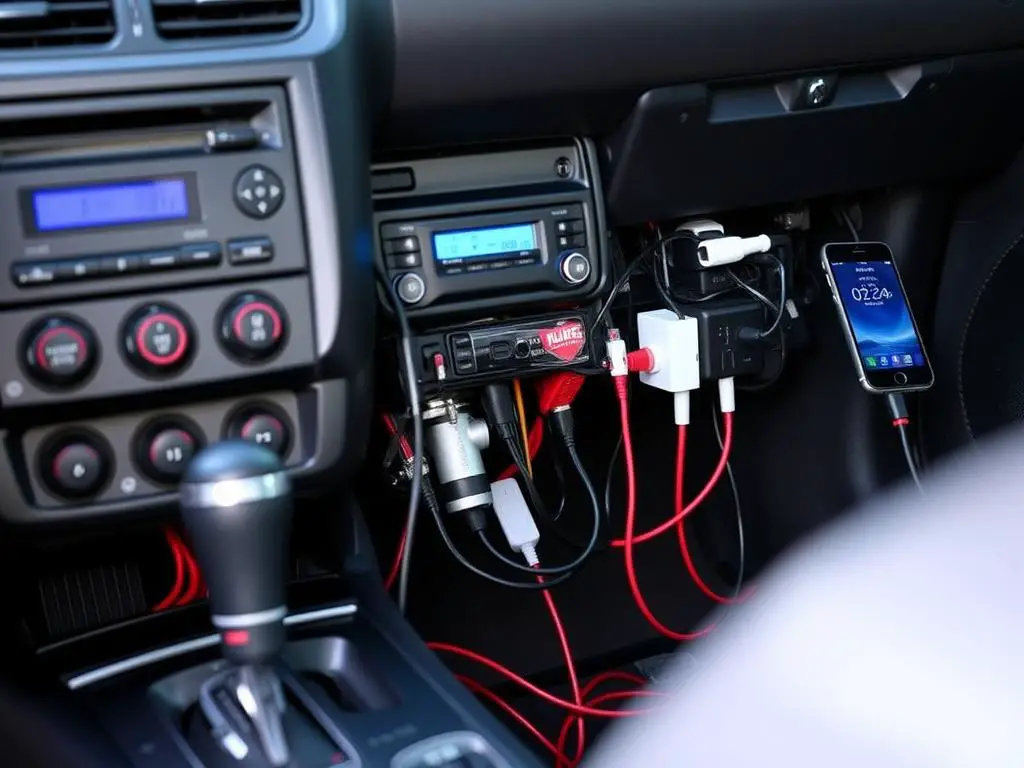
Extreme Climate Regions
In areas with very cold winters or extremely hot summers, AGM batteries offer better performance at temperature extremes. They’re less likely to freeze in winter and resist heat-related degradation in summer.
Infrequent Use Vehicles
For vehicles that sit for extended periods (weekend cars, seasonal vehicles, or collector cars), AGM batteries maintain their charge longer when not in use and are more resistant to sulfation from sitting discharged.
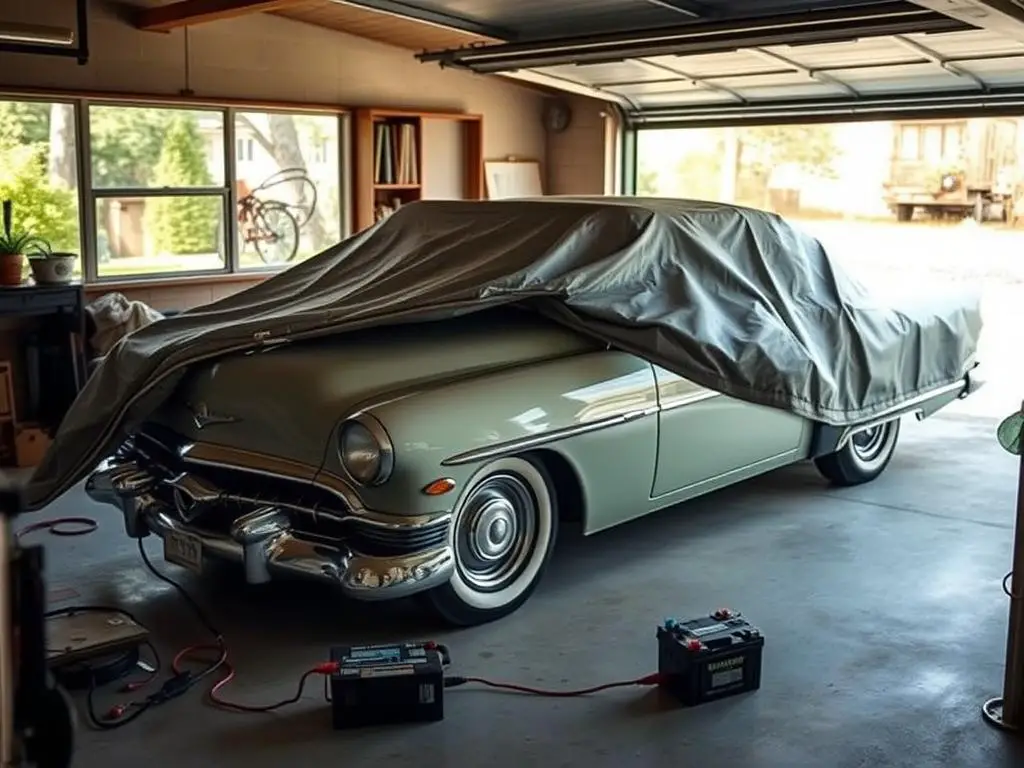
Cost Comparison and Return on Investment
Stop-start batteries require a higher initial investment than conventional batteries, but they may offer better value over time in certain situations. Here’s a breakdown of the cost factors to consider:
| Battery Type | Average Cost Range | Expected Lifespan | Cost Per Year | Best For |
| Conventional | $80-150 | 3-4 years | $20-50 | Basic transportation with minimal electronics |
| EFB | $120-200 | 4-5 years | $24-50 | Vehicles with moderate electronic demands |
| AGM | $160-300 | 5-7 years | $23-60 | High-demand electronics, extreme climates |
When the Higher Cost Makes Financial Sense
The additional investment in a stop-start battery may be justified in these scenarios:
- Reliability Priority: When the cost of a breakdown (missed appointments, towing, lost work) outweighs the additional battery expense
- Long-Term Ownership: If you plan to keep your vehicle for many years, the longer lifespan of AGM batteries can provide better value
- Harsh Conditions: For vehicles operating in extreme temperatures or with heavy electrical demands where conventional batteries fail prematurely
- Reduced Maintenance: AGM batteries require virtually no maintenance compared to some conventional batteries
Installation and Safety Considerations
If you decide to install a stop-start battery in your conventional vehicle, keep these important safety and installation factors in mind:
Installation Best Practices
- Verify Compatibility: Confirm the battery group size, terminal type, and physical dimensions match your vehicle requirements
- Disconnect Properly: Always disconnect the negative terminal first, then positive when removing the old battery
- Clean Connections: Remove corrosion from terminals and battery tray before installing the new battery
- Secure Mounting: Ensure the battery is firmly secured with the appropriate hold-down mechanism
- Connect Correctly: Connect the positive terminal first, then negative when installing the new battery
- Apply Terminal Protection: Use terminal protectant spray or grease to prevent future corrosion
Safety Precautions
Always wear safety glasses and gloves when handling batteries. Batteries contain sulfuric acid that can cause severe burns and produce explosive hydrogen gas.
- Never smoke or create sparks near batteries
- Avoid wearing metal jewelry that could short battery terminals
- Keep baking soda and water nearby to neutralize acid spills
- Work in a well-ventilated area
- Dispose of old batteries properly at recycling centers
- Consult your vehicle’s manual for specific battery replacement procedures
“While DIY battery replacement is possible for many vehicle owners, if you’re uncertain about the process or your vehicle has complex electronic systems, it’s best to have a professional handle the installation to avoid potential damage or reset requirements.”
Expert Recommendations and Manufacturer Guidelines
We consulted with automotive experts and battery manufacturers to provide these authoritative recommendations for using stop-start batteries in conventional vehicles:
When should I consider upgrading to a stop-start battery in my conventional car?
Consider upgrading if your vehicle has any of these characteristics:
- Multiple electronic accessories or aftermarket equipment
- Operation in extreme temperature environments
- History of premature battery failures
- Frequent short trips that don’t allow full battery recharging
- Extended periods without use (seasonal vehicles)
- Need for maximum reliability and reduced breakdown risk
Are there any vehicles where stop-start batteries should NOT be used?
While stop-start batteries are generally compatible with most vehicles, there are a few situations where they may not be ideal:
- Classic cars with original electrical systems designed for specific battery types
- Vehicles with voltage-sensitive electronics calibrated for conventional battery discharge curves
- Applications where the additional cost cannot be justified by the benefits
Always consult your vehicle manufacturer’s recommendations before making a change.
Do I need to reprogram my vehicle’s computer when switching to a stop-start battery?
For most conventional vehicles without battery management systems, no reprogramming is necessary. However, some newer vehicles with sophisticated electronics may need to have their battery management system reset or recalibrated to recognize the new battery type. Consult your vehicle’s manual or a qualified technician if you’re unsure.
Manufacturer Consensus: Major battery manufacturers agree that while stop-start batteries can be used in conventional vehicles, the cost-benefit analysis should be considered carefully. The premium price is best justified when the vehicle has high electrical demands, operates in extreme conditions, or when maximum reliability is required.
Conclusion: Is a Stop-Start Battery Right for Your Normal Car?
Yes, you can use a stop-start battery in a normal car without start-stop technology. These advanced batteries are fully compatible with conventional vehicles and can offer several advantages, particularly for cars with high electrical demands or those operating in challenging conditions.
However, the decision should be based on your specific needs and circumstances. The premium price of stop-start batteries (especially AGM types) may not be justified for basic transportation with minimal electronics and moderate driving conditions. For vehicles with numerous accessories, those operating in extreme climates, or when maximum reliability is essential, the investment in a stop-start battery can provide tangible benefits and potentially better long-term value.
When replacing your battery, always ensure proper physical compatibility (size, terminal configuration) and follow safe installation practices. For vehicles with sophisticated electronics, consider professional installation to avoid potential complications with battery management systems.
Ultimately, the best battery choice depends on balancing your vehicle’s requirements, driving conditions, budget considerations, and how long you plan to keep your vehicle. By understanding the differences between battery technologies and their respective advantages, you can make an informed decision that provides reliable performance for years to come.
Ready to Upgrade Your Battery?
Browse our selection of premium conventional, EFB, and AGM batteries to find the perfect match for your vehicle and driving needs. All batteries come with free installation guidance and our satisfaction guarantee.
